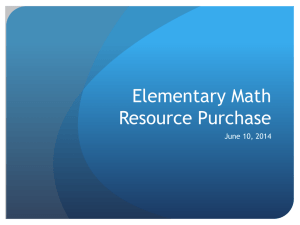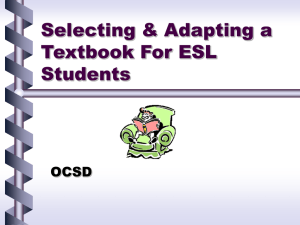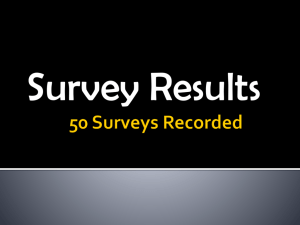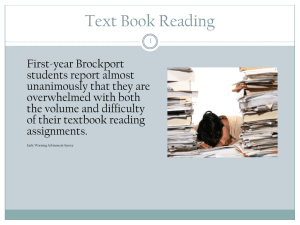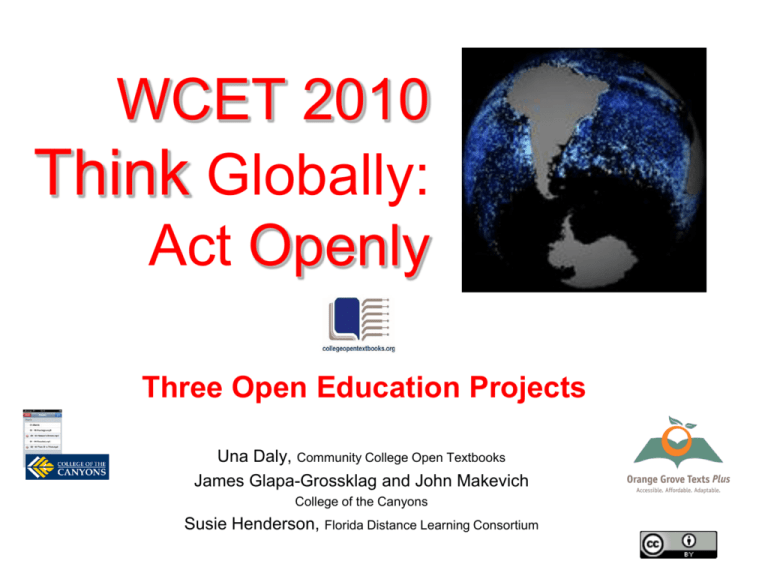
WCET 2010
Think Globally:
Act Openly
Three Open Education Projects
Una Daly, Community College Open Textbooks
James Glapa-Grossklag and John Makevich
College of the Canyons
Susie Henderson, Florida Distance Learning Consortium
Agenda
•
•
•
•
•
•
•
Broken Textbook Model
History of CCCOER
College Open Texbook Goal
What is an Open Textbook?
Creative Commons Licensing
Collaboration
Join our team…
2
Broken Textbook Business Model
• Students spend $900/year on average.
• Prices rising at 4 X inflation rate.
• Academic authors often paid poorly.
• Instructors often must upgrade to new, editions which
eliminate the used market.
Source: student PIRGs Affordable Textbooks 2010
3
Community College Consortium
Open Education Resources
(CCOER)
1
2
1.
2.
3.
4.
3
Martha Kanter, Chancellor College District
Dr. Judy Baker, Foothill College Dean
Hal Plotkin, College District Trustee
Dr. Barbara Illowsky, Author & Teacher
funded by William & Flora Hewlett Foundation
4
CCCOER Member Colleges
Who is the COT collaborative?
COT Collaborative Goal
• Empower Faculty to
– Find
– Select
– Adopt
– Share
High Quality Open Textbooks
7
An open textbook is…
• Modifiable by the instructor
– Digital, Modular
– Creative Commons
• Low cost to the students
– Free online
– Printable for free or low cost
paper bound copies ($10-$60)
Labeled for reuse by MrKCoolsPhotostream
Traditional Copyright vs. Open License
Publisher: Wiley
Open: Connexions & QOOP
Downloadable version:
$77.50
Downloadable & online versions:
FREE
Printed bound version:
$141.95 new
$110.25 used
Printed bound version:
$31.95 new
9
“Collaboration is powerful.
Enormous collaborative efforts on
clearly-defined, useful projects can
be world-changing.
What would happen if
massive numbers of experts
of the world were to unite
and, with the help of the
general public, do what they
do best – impart knowledge
to the world for free?”
~ Larry Sanger,
Co-Founder of Wikipedia
COT Collaboration Model
•
•
•
•
•
•
•
Online Community of Practice
Train-the-trainer Program
Peer Reviews
Accessibility Reviews
Research
Author/Adopter communities
Partnering with Repositories, Publishers,
Students, Bookstore Managers, Statewide
Organizations.
Online Community of Practice
• 600+ Members
• Special Interest Groups
–
–
–
–
–
–
•
•
•
•
Adopters
Research
Authors
Accessibility
Reviewers
Librarians
Events Posted
Blog
Broadcast Email
Free to Join
College Open Textbook Blog
Adopting Open Textbooks
“train-the-trainer” workshops
• 500 College faculty, staff trained
– 20 workshops, 12 states
– Online Moodle, Peer2PeerU
• 50 Advocate-trainer led
workshops.
• Advocacy efforts at
college and state level
• Training resources
created and shared
FL, TX, CA, KY, WA, MI, MD, GA
Quality is #1 Faculty Concern
• 100 Open Textbooks Peer-Reviewed
• Review textbooks for
–
–
–
–
–
–
–
Reading level
Depth and scope
Quality and accuracy
Cultural relevance
Currency
Authority of source
Clarity
• Posted to COT website
Accessibility Reviews
• 100 Open Textbooks Reviewed
– For learners with disabilities
• Review textbooks for
– Section 508
– Web Content Access Guidelines
– Best Practices Cognitive Learning
• Letters sent to authors
Photo by:John_C_Abell_CC-NCSA
• Reviews posted to COT website
• Analysis of common accessibility issues found
Open Education Research
• Research open textbook adoption
– Interviews with over 50 faculty,
administrators, and students
• Faculty-driven research (Brian Evans, Econ.)
– 129 students (open textbooks) to 124 students
(traditional textbooks)
COST: $3194 vs. $10,867
Author-Adopter Community
Collaborative Statistics
•
•
•
•
Connexions and iTunes University
More than 50 Adoptions at 30 Colleges
10 Custom versions
Moodle course with videos
RESULT
– Better open textbook: ancillaries, videos,
homework management systems.
Author-Adopter Community
COT-sponsored Pilot
• Introduction to Sociology by Ron Hammond
• Adopter & Content Expert
• Adopted at 4 Colleges
– in 3 States
• Potential authoring software:
– Ning, Nixty, Playlists
RESULT
– Better open textbook with faculty adopter
customizations
Open Textbook Publishing
Partnerships
Who’s Next …?
Promote OER on Campus
• Invite All Stakeholders
–
–
–
–
–
–
–
–
–
Curriculum Committees
Academic Senate
Articulation Officer
Tech Support
Bookstore Manager
Librarians
Faculty
Administrators
Students
Join Us
• Join College Open Textbooks
http://collegeopentextbooks.org
• Join the OER College Consortium http://oerconsortium.org
• Visit the OER Center for California
http://grou.ps/oercenter
• Visit Open Access Textbooks
http://www.openaccesstextbooks.org
College of the Canyons
Santa Clarita, CA
Creating Open Educational Resource (OER)
Content Playlists
as Alternatives to Traditional Textbook Materials
Our Support
• Our work is supported by a U.S. DOE FIPSE
(Fund for Improvement of Post Secondary
Education) Special Focus grant
Today’s Take-out Menu
• As this presentation moves along, you should:
– Be introduced to the motivation for new
alternatives for textbooks
– Become familiar with our Open Educational
Resource (OER) grant and its goals
– Learn about some of the basic steps that would be
involved in creating a content playlist
So, Is the Textbook Forever?
Well……….
TODAY’S
TEXTBOOK
IS
MADE
OF
PAPER…
LOT’S OF
PAPER.
Flickr, borman818
How Much?
• Consider this example:
– Student spends $180 on a textbook for a course
and $30 on a textbook supplement
• SUBTOTAL = $210
– Course
• 3 units
• Current cost per unit = $26
• Cost of course itself = $78
– In this scenario, the textbook and supplement
represent 73% of the overall cost of the course!
So, clearly we have a motivation!
Now what?
Our Goals
Given: Textbook provides structure
and content
1.Focus on creation of supplemental
materials and rental of existing texts
2.Develop playlists of academic content to
either supplement or replace textbooks
3.Prepare some potential models of content
delivery to be prepared for the posttextbook era, if it arises
Our Goals
Given: Textbook provides structure and
content
1.Focus on creation of supplemental materials
and rental of existing texts
2.Develop playlists of academic content to
either supplement or replace textbooks
3.Prepare some potential models of content
delivery to be prepared for the post-textbook
era, if it arises
Why playlists?
REMEMBER
THIS?
Flickr, AdamL212
So, what is a playlist?
Introduction text,
learning objectives and
outcomes, etc.
Another website
article/text
Website with
text/articles
Transition text
Transition text
Media
(captioned)
Reasons to Consider Playlists
• The content is already out there.
• Could playlist development be an easier process
to sustain than textbook development?
– Perhaps a fusion of both playlist and open textbook
approaches represents the future of content delivery?
• Fundamentals of the technique are familiar
– Faculty are accustomed to assembling existing content
already (think learning units in a course management
system).
– We just desire to make it a more formal process.
Where are we now? Content
development.
• Focus on both individual content objects and
larger projects
– Building the Scientist
– Basic Skills Guided Learning Activities
• By getting objects developed around themes,
the hope is to facilitate easier playlist
development
Challenges thus far
• Faculty incentives
• Faculty workload
• Collaboration with campus bookstore and
printing facilities
– Long term goal of having kiosk printing capabilities
for students on campus
• Communication between production staff and
faculty
What’s next?
• Continue developing learning objects, mostly
around common themes or subject areas.
• We’re in the planning stages now for two
content playlists.
– We will begin development in the next couple
months.
WCET 2010
Open Education Project #3
Think
Globally:
Act Openly
1. Open Access Textbooks – a
FIPSE grant to create a model
for statewide use of open
textbooks
Part III
2. Orange Grove Texts Plus – a
Florida open textbook project
open for all
www.openaccesstexts.org
What does “OPEN” mean?
41
Changed by the creators from:
• Copyright ALL Rights Reserved
to
• Copyright SOME Rights Reserved
under an open license
www.creativecommons.org
From the Creative Commons store
Open Texts and eBooks:
What’s the difference?
Open Textbooks
• Open License i.e. Creative
Commons
• Can usually be modified
or customized
• Viewed/read for no cost
online
• permanently available in a
repository or as a free
download
• No limits on student self
printing
• Low cost POD version
eBooks (Publisher)
• Restrictive licenses
• No modifications
• Accessible for a limited
time period
• Usually have restrictions
on the amount of material
students can print out
And, a new term…
• Dynamic Textbooks are open access
textbooks for which there are a large
number of embedded links to digital
resources such as original source
documents, maps, simulations, videos,
games, podcasts, flash animations, and
relevant websites.
• In many cases, a low cost, print-on-demand
version is also available for a Dynamic
Textbook.
Building on existing and new
resources
..is a partnership between
The Orange Grove
Repository and the
University Press of Florida
(UPF) to make open
textbooks available for
postsecondary education
Launched September, 2009
– The Orange Grove
(www.theorangegrove.org) is the
repository/home for over 201 open and
online texts, in addition to many other
types of resources
– UPF is the official publisher of Florida’s
postsecondary system
– Integrated Book Technology: ondemand printer
– WebAssign: online homework and
grading, secure online testing with
targeted feedback
www.theorangegrove.org
The Orange Grove Repository is
the storage container…
• Stable, persistent archiving of any content
• Access for educators to a variety of high quality
resources
• Distribution vehicle for grant products and stateowned or state-licensed content
• Avoid duplication of development effort
• Federate with and harvest other repositories
• Integrates into learning management systems for
single sign-on
• Open textbook distribution
The Orange Grove provides at no cost:
– Repository software license – perpetual
– Annual maintenance fee
– Development of tailored interfaces and metadata
schemas
– OG staff support
– Upgrades to software
– 24 X 7 network support
– Bandwidth
– Hardware: server cluster
– Nightly file backup
Copyright
• The Orange Grove owns NOTHING!
• Supports Creative Commons License
– You keep your copyright but allow people to copy and
distribute your work provided they give you credit —
and only on the conditions you specify.
Partner 2:
The University Press of Florida
Discover the World with Florida Books
UPF – By the numbers….
• Mission is to produce scholarly works
• 65 year old publisher
• Publish 90+ new titles/year
• 1632 titles in print
• Authors from 37 nations
• 10% of authors are Florida faculty or
graduates
• Authors and press are recipients of multiple
awards
• Non-profit organization
• Sales average $3.4 million/year
The University Press of Florida (UPF)
…can work with faculty to
develop or review resources.
Ensuring
quality of open textbooks #1
faculty concern
UPF Open Textbook Publishing Services:
• Choose level of copy edit:
– proofread only
– light edit
– heavy edit
• Upload material to be created: can be original word
doc, PDF, XML format
• Determine if © permissions need to be cleared –
affects per unit price
• Submit word doc of table of contents, title page and
cover image.
• Choose binding (case or paper) and chose CC license
• Students download for free or purchase books
directly from OGT+ site at cost + overhead recovery
Partner 3: WebAssign
• Independent Company based in Raleigh, NC www.webassign.net
• Dynamic online homework system for math, physics, chemistry,
and statistics – automatically graded, tracked assignments
• Supports a variety of question types and tools for entering
mathematical and chemical notation
• Can support e-books and links to additional resources from
within the WebAssign course – videos, tutorials etc.
• Offer instructors the ability to put in their own content
(questions, notes, videos) and deliver truly customized courses
•
08/09/2010
<2>
Open Access Textbook Initiative
• Partnering with University Press of Florida and OGT+ to offer online
homework option for key open source e-books
• Currently offer College Algebra and Introduction to Statistics
(Calculus is in production from University of Florida)
• Features coded homework problems (randomized), with links to the
e-books and video content for help or remediation
• Online access to both e-book and homework is $25 per semester
• Here’s the link to Statistics:
http://www.webassign.net/collaborativestatistics
• Here’s the link to College Algebra:
http://www.webassign.net/stitz
08/09/2010
<3>
Collaborative Statistics
With over 1500 coded homework exercises,
Collaborative Statistics is a well-tested text for use
in the Introduction to Statistics course. There are
also pre-loaded instructional videos for students
available for use that were developed by the
author team.
08/09/2010
<2>
College Algebra
Over 1400 coded online homework questions
as well as links to instructional videos and the
College Algebra e-book. Full symbols palette available
that allows students to write in the appropriate math
notation in their answers.
08/09/2010
<2>
LMS Integration
•WebAssign does support a Blackboard building block that allows for single sign-on for
students directly into WebAssign through their existing Blackboard course
08/09/2010
<2>
Benefits to Students
• Electronic versions of all OGT+ textbooks are free,
saving cash-strapped students a significant amount of
money.
• Portability: once downloaded, textbooks can be
accessed on any type of computer, e-reader, or PDA.
• Flexibility: students can choose free e-book, print out
select portions, or purchase paper back for a fraction of
cost of traditional textbooks.
• No time limits or restrictions on usage.
Collaborations
• UF Math Department developed open texts for
Calculus
– Beta testing with Honors classes this fall
– 1000 students in Spring Semester using open text
– 1500 students in Fall Semester using open text
• WebAssign – online homework, testing, and
tutorials for math, science and behavioral
sciences. WebAssign works directly with OGT+
on Algebra, Statistics, and Calculus.
Join us on –
Facebook and our websites!
www.theorangegrove.org
www.openaccesstextbooks.org
http://www.facebook.com/pages/TheOrangeGrove/
How to get involved
• Adopt an existing OGT+ text in your class
• Create and share supplemental materials to accompany
an OGT+ text
• Serve as peer reviewer for OGT+ GenEd
• Review and tag open textbooks
• Advocate for open textbooks on your campus and
institutional involvement
• Join our free webinars – www.openaccesstextbooks.org
• Submit an open textbook and peer review to Kara
Schwartz at Kara@upf.com


